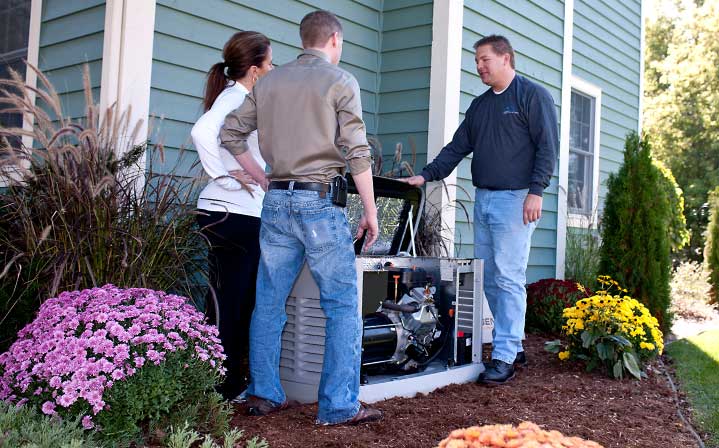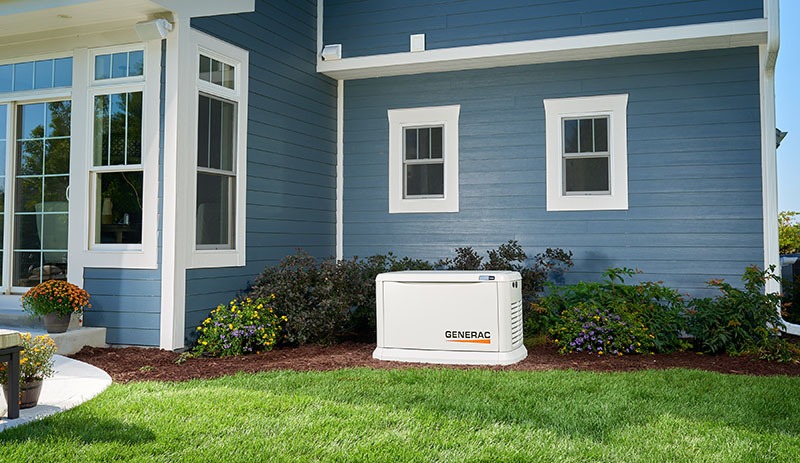Tips to Determine the Home Backup or Portable Generator Installation Costs
Last Updated on August 10, 2022

We all know everything good costs something. When it comes to generators, the same principle applies. Well, most homeowners usually pay $1,411- $7,684 to have a good generator installed in their home.
Please note that you may spend only $400 to bring a generator home; the most expensive generator costs around $9,500. You only have to pay more to have the machine installed. In general, the average installation cost (Considering all the variables) is about $4,542.
A Generator is Valuable
But it’s always worth it to invest in this equipment. Many homeowners know that the generator is invaluable when a natural disaster strikes or when the weather changes abruptly and they’re cut off from the power grid. You can still have light, heat, and utility power at home with your generator at such times.
You can choose any type of generator depending on your budget.
Let’s consider a few factors that often influence the ideal generator’s price:
Generator Types Determine the Price
If you want to have the cheapest generator, you can get one for as little as $550- just pick a gasoline generator. The most expensive gasoline generators cost around $3,000. Many love the gasoline generator because it’s easy to fuel; you can easily get gas in most regions of the country.
The only limitation is that it can be challenging to store gasoline at home. Moreover, gasoline has a short shelf life and can be problematic with the generator in cold weather.
What about the installation cost? The average installation cost for a gasoline generator starts from $4,300 to $10,500.
Now, let’s discuss the cost of different types of generators:
Natural Gas Generators
Many homeowners find it convenient to install a natural gas generator. Of course, it’s relatively costly buying a natural gas generator. The prices range from $1,900 to $5,000.
This type of generator is generally convenient because you don’t have to prepare a full storage- you can merely hook it up to your utility grid, and that’s it; you’re good to go.
A natural gas generator also works well during cold weather. The downside is that it uses more fuel when compared with other types of generators.
Diesel Generators
You can buy a diesel generator for as little as $3,000. The most expensive diesel generator costs around $15,000. Many people use diesel generators to produce power for the entire home.
You might find that larger diesel generators generally run more efficiently compared to natural gas or gasoline generators. And you might also find this to be true: If you need more power at home, simply buy a diesel generator- the benefits are enormous.
Liquid Propane Generators
Essentially, liquid propane produces relatively clean power and can have an indefinite shelf life- you merely have to store it correctly. Unfortunately, a liquid propane generator does not last long. It can also be challenging to keep the fuel (propane) at home.
Regardless, are you ready to deal with such challenges? Then get ready- you’ll need $500 to buy the cheapest propane generator.
The most expensive model costs around $6,000.
Solar Generators
It costs a minimum of $300 and a maximum of $5,000 to purchase a home solar generator. But you’ll likely find this investment worthwhile. One benefit of solar home equipment is sustainability- you don’t have to provide a constant fuel supply to such generators.
The downside with solar units is that you can’t store large amounts of energy in smaller solar units. And during storms, such units are often affected by limited sun exposure.
What Does it Cost to Install a Whole House Generator?

Yes, what’s the average cost of a whole-house generator? Many families know the importance of investing in home safety and comfort. This is particularly true in areas with frequent power outages.
According to the HomeAdvisor website, the average cost of purchasing a whole house generator is $4,074. But the total cost may be much higher. If you have a medium-sized home, you can expect to pay around $12,250 in advance.
The upfront charges can shoot to $27,150. Further, you’ll be expected to pay $165- $485 in annual maintenance and repair costs. Ultimately, the overall price depends on individual circumstances.
Comparing the Cost of Partial House with Whole House Generators
You should expect to pay more for a whole house generator than what you’d pay for a partial house generator. Of course, this makes sense- the latter can only provide a part of your home electrical needs. In contrast, a whole house generator provides you with the most reliable, consistent power.
With a whole house generator, you can continue satisfying your home power needs during a lengthy power outage- in fact, you can continue with your regular activities as if the power outage never occurred.
If you regularly deal with frequent power issues, this might be the solution. Such a generator will protect you from the ravages of natural disasters (like hurricanes) that can shut off the power for several weeks.
A relatively cheaper option is backup generators- the downside is that they cannot power all appliances. But you can still run essential appliances like refrigeration, heating, and water heating. If you have frequent outages of a shorter duration, you can consider this option.
The Generator Capacity Determines its Cost
When considering the cost of a whole house generator, the most crucial consideration is the machine’s capacity. But what does the term “generator capacity” refer to? Well, this is the amount of power your generator can actually produce at a specific time to sustain your home electrical applications.
Keep in mind that a generator that doesn’t meet your home electric needs will put undue pressure on the unit; this can damage some devices connected to it. Also, remember this: When the generator’s capacity is high, the cost will increase.
Determining Your Power Needs
Keep in mind that a smaller home might need more heating (and more power) if the area is cooler. At the same time, you can run a larger home with a smaller-capacity generator if your electrical needs are minimal.
How can you determine your actual electrical needs? Add the amount of power it takes to start up each appliance. Note that this is different from the amount needed to maintain the appliances. A refrigerator requires 2,800 watts to start but only 700 watts to keep the device running. Suggestion: You can use an online generator size calculator to determine each appliances’ average wattage.
What’s the Cost of Installing a Whole House Generator?
Consider the cost of installing a whole house generator keenly. The prices vary depending on the generator size and make. Think of your residential location and the electrician’s hourly rate.
Also, remember this vital point: The installation cost is often around 75% of the generator’s purchase cost. So, if you spent $10,000 to buy the generator, you could pay $7,500 as installation cost (this makes it $17,500). Moreover, you could spend $500-900 to install a subpanel and complete the home wiring system. This means the overall costs may be higher.
Caution: Unless you’re a qualified engineer, never attempt to install a home backup power to save money. Such generators require sophisticated wiring and gas hookup. Hence, mistakes could be costly, dangerous, and life-threatening.
Standby Generator vs Portable Generator Costs
You can consider purchasing a standby generator to offset the cost of installing a home backup generator. Keep in mind that a portable generator offers a lower power capacity (maximum 7,000 watts). But portable generators are way cheaper- they cost $200 to 5,000. Moreover, they don’t need installation and can be easily maintained.
Take Care When Using a Generator
But there’s a downside with portable generators; you have to purchase fuel power. Also, it’s best to store the generator indoors; store them separately from where you keep the fuel. Further, when the power goes off, you have no option but to take your generator outdoors, add some fuel, set the electrical connection, and start the machine.
On their part, standby generators are designed with an automatic switch; they’ll automatically start when the power goes off. Also, they have a greater power capacity than portable generators.
Caution: Never start the generator indoors or in an enclosed place (like a garage); it could lead to carbon monoxide poisoning.
Determining the Cost of Whole House Generator Repair & Maintenance
Keep this in mind: A whole house generator must be purchased first; it must then be installed -the cost of installing it at home can be enormous. And there are other costs.
For instance, you must run the generator once or twice a week for maintenance purposes. It costs more than $5 to run your generator for about 15 minutes (in terms of fuel). This means you’ll pay more than $100 per year in fuel- and there’s the cost of outages (you could spend $30 a day during outages).
Also, you must periodically hire a technician to inspect your generator about twice a year. This will cost you $65 up to $ 85 an hour (depending on the technician’s cost). The generator repair costs can run to $75-$300.
Fortunately, a well-maintained generator can last for 20 years or more.
Small Portable Generators Price
It costs $ 300-$1,200 to buy a small portable unit- depending on its power and size. If you find the cost of a backup generator to be high, this can be the best option. Also, you can invest in a portable generator if there are frequent power outages in your area.
Final Thoughts
Depending on your needs, you may purchase a home backup generator or a portable generator to satisfy your home requirements. Also, you can easily run a portable generator since it doesn’t require professional installation.
If you purchase a permanent home unit, do not try to install it personally- for everyone’s safety, get a qualified physician to help you. Further, such a professional may advise you on the size and power capacity of a suitable generator.
Yes, take time to pick the best option that cares for your home power needs.
Contents
- A Generator is Valuable
- Generator Types Determine the Price
- What Does it Cost to Install a Whole House Generator?
- What’s the Cost of Installing a Whole House Generator?
- Standby Generator vs Portable Generator Costs
- Determining the Cost of Whole House Generator Repair & Maintenance
- Small Portable Generators Price
- Final Thoughts